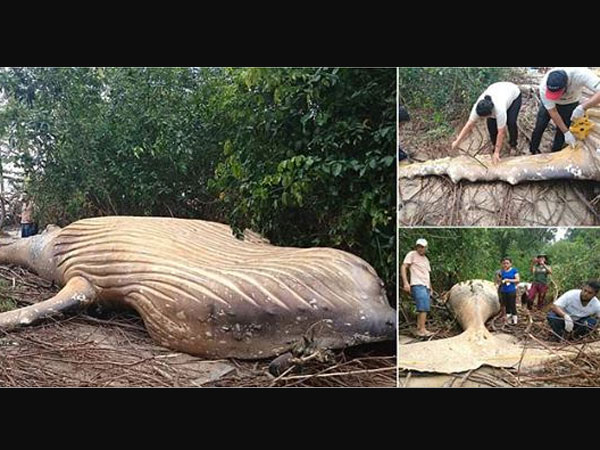Scientists are puzzling over the discovery of a dead humpback whale in the Amazon jungle, about 50 feet from the ocean shore.
The calf was found on Friday on the tropical forest floor of Marajó Island, which sits at the mouth of the Amazon river, after reports that vultures were scavenging on the carcass. It was photographed and examined by the wildlife nonprofit Bicho D’água Institute and the region’s Municipal Secretariat of Health, Sanitation, and Environment (SEMMA).
Estimated to be about one year old, the whale baby was already eight meters (26 feet) from head to tail, according to an Instagram post from Bicho D’água. Adult humpback whales can grow to twice that size.
The team is not sure exactly how the whale ended up in the jungle.
“We believe this is a calf which may have been traveling with its mother and probably got lost or separated during the migratory cycle,” Renata Emin, a marine mammal expert with Bicho D’água, told the Brazilian news site O Liberal.
“We’re still not sure how it landed here, but we’re guessing that the creature was floating close to the shore and the tide, which has been pretty considerable over the past few days, picked it up and threw it inland, into the mangrove,” she said.
Emin added that humpback sightings in northern Brazil are unusual at this time of year. Southern Hemisphere humpbacks tend to spend the southern summer months, such as February, feeding in warmer polar waters.
The team has collected samples from the calf to help determine its cause of death. This autopsy will take about 10 days, according to Newsweek. While the carcass is too big to move, the researchers plan to eventually extract its skeleton for study at the Museu Paraense Emílio Goeldi, a natural history museum in the nearby city of Belém, according to the Independent.
As odd as it sounds for a whale to wind up on the Amazon jungle floor, it’s not unprecedented. In November 2007, a minke whale stranded itself on an Amazon sandbank nearly 1,000 miles inland of the Atlantic Ocean. Local rescuers were able to free the whale, but it was found dead just a few days later.
While the Amazon river is apparently turning into somewhat of a death trap for whales, it is home to many marine mammals, such as dolphins and manatees.








